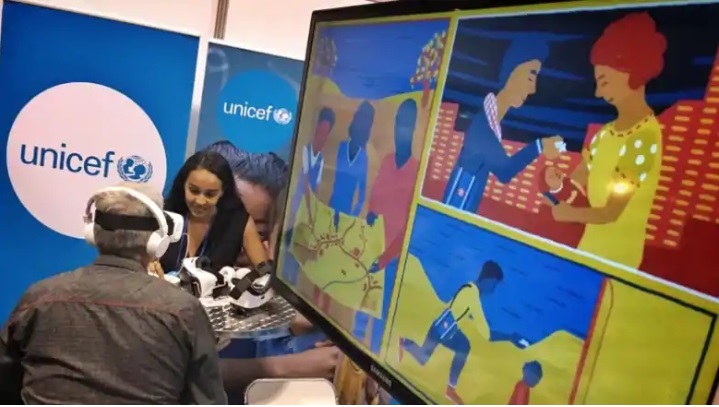Rotary Club members from around the world are showcasing hundreds of humanitarian projects as a Rotary International Convention gets underway in Toronto.

The projects, which include everything from polio immunisation drives in India and Africa to informal education programmes for young refugees in Greece to water distribution efforts in the Democratic Republic of Congo, are being exhibited in booths in a hall dubbed the “House of Friendship” at the Metro Toronto Convention Centre.
Organisers say the House of Friendship is an important part of the 109th annual International Rotary Convention, which opens on Sunday and has drawn about 25,000 Rotary club members to the city from more than 175 countries. The general sessions of the convention will be held at the Air Canada Centre.
Rotary Club, a global network with 1.2 million members, is an international service organisation.
At the House of Friendship, organisers say Rotarians are meeting each other, exchanging ideas, sharing advice and information about community service projects, setting up partnerships on those projects, and developing friendships.
Organisers say the projects demonstrate Rotary’s commitment to improving lives.
“A big part of Rotary is service above self,” says Michael Cooksey, co-chair of the host organising committee for the 2018 Rotary International Convention in Toronto.
“You want to be able to look after your community and learn about projects others are doing,” he said on Saturday. “It’s a meeting place for Rotarians. They can purchase merchandise, they can show off their projects, and generally, have great fellowship.”
Cooksey said the House of Friendship — a trade show of sorts that began at a Rotary convention in Toronto in 1924 — is now a feature of all international Rotary conventions.
Hundreds of Rotary club members attended the official opening of the House of Friendship on Saturday, with the ceremony featuring a town crier, Indigenous drummers and Chinese lion dancers.
Rotary’s signature project is called PolioPlus, a campaign to eradicate polio. The campaign began in 1985 and has vaccinated thousands of children through national immunisation days. At that time, polio was present in more than 100 countries.
Now, the infectious disease is present in only three countries — Pakistan, Afghanistan and Nigeria. There were 22 cases reported last year.
Rotarians themselves pledged money and obtained government funds for the campaign over the years. “It certainly has been a journey,” Cooksey said.
At the UNICEF Canada booth, a vaccination carrier is on the table to show Rotary club members where vaccinations are stored.
The grey carrier is a portable box that is light-weight and double-walled with space for dozens of vials, and can be carried by community health workers on foot to remote areas.
There are also virtual reality headsets which allow visitors to see how polio immunisation drives work.
David Morley, president and CEO of UNICEF Canada, said Rotary and UNICEF Canada are continuing their work to try to end polio around the world. He spoke on Saturday as part of Rotary’s peace-building summit.
“I talked about the importance of equity for peace and how you can’t have peace if children of the world are left behind,” he said. “Almost eradicating polio is really peace-building as well. It’s building blocks for peace.”
Ensuring that people are in good health is a path to peace as well, he said. In countries where there is inequity and where disease is rampant, people can get mired in conflict, he added.
“Having healthy children, well, people have stuff to live for then,” he said. “That is peace-building on the ground.”
At the Amal Alliance booth, founder and director Danielle de la Fuente demonstrated a flexible ball and a “happy cube,” both of which help refugee children remember how to breathe in order to relax their nervous systems and regulate their emotions after they have suffered trauma.
Amal Alliance, based in New York City, helps displaced children through education and integration programmes. It uses children’s yoga, mindfulness, art and music therapy, and storytelling and reading circles, arts and crafts to help heal trauma.
“This is a wonderful opportunity to showcase to all of our fellow Rotarians what we do, and it’s fantastic to see what other people are doing so we can collaborate,” De la Fuente said.
“The more people are aware of different circumstances, the better we can kind of come together to do good.”
Meanwhile, at Hygiene and Sanitation at Kinsenso Town in the Democratic Republic of Congo booth, photographs show how the project is helping to distribute clean water to people who live in communities near Kinshasa, the capital.
Michele Guy, co-chair of the host organising committee for Rotary International, said the House of Friendship brings all of the members attending the convention together. It underscores the organisation’s mandate.
“The whole idea of Rotary is just to help other people. It sounds simple, but it’s a wonderful, wonderful thing to do. All Rotarians who do this, they’ve end up getting so much more out of it than they have put in.”
The convention’s opening session begins on Sunday at the Air Canada Centre with a flag presentation. The general session, along with the House of Friendship, continues through to Wednesday.
Former US First Lady Laura Bush is scheduled to speak on Tuesday morning.
Source: CBC





